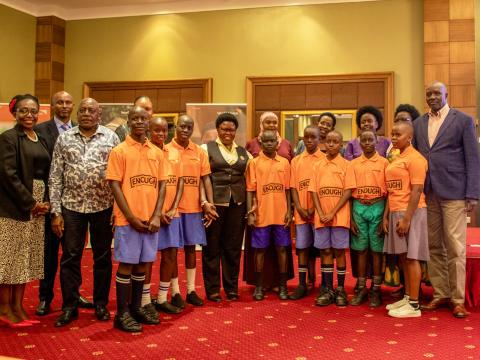World Vision Uganda Launches Campaign to End Child Hunger and Malnutrition

KAMPALA, AUGUST 21, 2024
World Vision Uganda has officially launched the national ENOUGH Campaign, aimed at ending child hunger and malnutrition throughout Uganda today Wednesday, August 21, 2O24 at the Sheraton Kampala Hotel.
This initiative aligns with global and regional frameworks, including the Sustainable Development Goals (SDGs), Africa Agenda 2063, the East African Community Vision 2050, Uganda's National Development Plan III, and the upcoming National Development Plan IV, as well as Vision 2040.
Speaking at today’s launch, Jeremiah Nyagah, National Director, World Vision Uganda alludes to the organization’s impact in improving the well-being of all vulnerable children in Uganda.
“World Vision Uganda has positively impacted over 3.5 million children through programs in health and nutrition, education, child protection, water and sanitation, disaster response, resilience, and livelihoods. These achievements have been possible through partnerships with the Government of Uganda, donors, and various partners. This has also included the introduction of initiatives that drive national focus towards having a safe future for the child. Some of these have previously included the “ It Takes a World to End Violence Against Children,” he says.
Nyagah added that in ensuring sustainable impact, World Vision Uganda will commit $75 million over the next two years to support the ENOUGH Campaign. This initiative will be implemented through programs in education, child protection, resilience and livelihoods, health and nutrition, and WASH across both development and response settings.
“The ENOUGH Campaign aims to: Promote the production of diversified, bio-fortified, nutrient-dense foods in the agricultural sector: Invest in mindset and social behavior change strategies for improved child nutrition: Strengthen policies and guidelines for safe and nutritious food, particularly in areas lacking formal social protection mechanisms: Mobilize resources to finance the agricultural sector and improve nutrition services. As such, we shall commit $75 Million to drive sustainability and impact of this initiative,” explained Jeremiah.
Jacqueline K. Opondo, Board Chairperson of World Vision Uganda, highlighted the importance of multi-sectoral, integrated approaches in promoting secure livelihoods and improving nutrition.
“Championing the end to child hunger and malnutrition expresses our commitment towards improving the lives of the children across our communities of operation and beyond. Our efforts in promoting climate-smart agriculture, supporting cash and food assistance programs, and strengthening community structures to address hunger and malnutrition remain a core aspect of our strategic agenda and focus,” she adds.
Hon. Rukia Nakadama, 3rd Deputy Prime Minister of Uganda, reaffirmed the government’s commitment to strengthening multi-sectoral collaboration and coordination among relevant ministries for effective nutrition and service delivery. She also expressed the government’s dedication to supporting the ENOUGH Campaign, particularly in raising awareness and providing nutrition education to change harmful feeding practices and promoting healthy growth for Uganda's children.
The ENOUGH Campaign seeks increased collaboration and offers opportunities to scale up initiatives aimed at enhancing food production and combating malnutrition. World Vision Uganda encourages all relevant ministries, agencies, and households to embrace this campaign to collectively end hunger and malnutrition in Uganda.
About World Vision Uganda:
World Vision is a Christian relief, development, and advocacy organisation dedicated to working with children, families, and their communities to reach their full potential by tackling the root causes of poverty and injustice. World Vision started working in Uganda in 1986, assisting communities in the ‘Luweero Triangle’ in central Uganda to resettle and rebuild their infrastructure after the 1981–1986 war. Activities extended to Arua and Nebbi districts in North-Western Uganda to address poverty and the lingering destruction from the 1978–1979 war. World Vision then moved into Gulu in 1988, commencing relief programmes for internally displaced people at the start of the ongoing conflict in Northern Uganda
For more information, please contact:
Connie Nankya
Communications, and Marketing Director via email: Connie_nankya@wvi.org